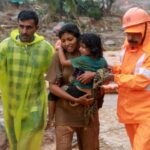“They are trying to impose in Venezuela a coup d’etat again of fascist and counter-revolutionary character.”
The Venezuelan attorney general warned that the blocking of roads or breaking any laws related to disturbances as part of protests would be met with the full force of the law.
He said 32 people had been detained on accusations ranging from destroying electoral materials to sparking acts of violence.
Several Western and Latin American countries, as well as international bodies including the UN, have called on the Venezuelan authorities to release voting records from individual polling stations.
Argentina is one country that has refused to recognize President Maduro’s election victory, and in response, Venezuela recalled diplomats from Buenos Aires.
Diplomats from six other Latin American countries – Chile, Costa Rica, Panama, Peru, the Dominican Republic, and Uruguay – have also been withdrawn for what Foreign Affairs Minister Yvan Gil described on social media as “interventionist actions and statements”.
Meanwhile, US senior administration officials said that the announced result “does not track with data that we’ve received through quick count mechanisms and other sources, which suggests that the result that was announced may be at odds with how people voted”.
That was “the principal source of our concern”, they added.
“That is why we are asking the Venezuelan electoral authorities to release the underlying data that supports the numbers that they have publicly announced.”
However, the US has not yet been drawn on what the result means for their sanctions policy towards Venezuela. Officials have emphasized that while they have doubts about the result, President Maduro did call an election and allow an opposition candidate to be on the ballot paper – even if the opposition leader was banned from running.
The Organization of American States (OAS) announced late on Monday it will hold a meeting on Wednesday of its permanent council over the Venezuelan results.



